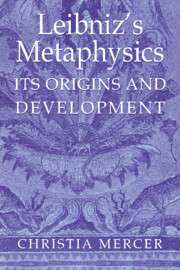Book contents
- Frontmatter
- Contents
- Acknowledgments
- References to Leibniz's works
- Introduction: first truths and half truths
- PART ONE METAPHYSICS OF METHOD
- PART TWO METAPHYSICS OF SUBSTANCE
- PART THREE METAPHYSICS OF DIVINITY
- 5 Platonist Assumptions
- 6 Metaphysics of Divinity, 1668–early 1671
- PART FOUR METAPHYSICS
- Appendix I (Not exactly) First truths
- Appendix II Leibniz's original assumptions
- Bibliography
- Index Locorum
- Index
6 - Metaphysics of Divinity, 1668–early 1671
from PART THREE - METAPHYSICS OF DIVINITY
Published online by Cambridge University Press: 12 March 2010
- Frontmatter
- Contents
- Acknowledgments
- References to Leibniz's works
- Introduction: first truths and half truths
- PART ONE METAPHYSICS OF METHOD
- PART TWO METAPHYSICS OF SUBSTANCE
- PART THREE METAPHYSICS OF DIVINITY
- 5 Platonist Assumptions
- 6 Metaphysics of Divinity, 1668–early 1671
- PART FOUR METAPHYSICS
- Appendix I (Not exactly) First truths
- Appendix II Leibniz's original assumptions
- Bibliography
- Index Locorum
- Index
Summary
In the final days of 1670, Leibniz wrote a letter to Jakob Thomasius in which he discusses the philosophy of Plato, the nature of mind, and the importance of final causes. In the letter, the young man compares his illustrious teacher to Plato and displays some of his own most basic beliefs about the place of mind in nature. Leibniz proclaims that Thomasius and Plato share a goal and method. In the same grand way that Plato helped his contemporaries escape “from the shadows” of materialism by introducing them to final causes, so Thomasius has encouraged his contemporaries to avoid the dangers of that false philosophy by reminding them of the importance of such causes in physics. As Leibniz sees it, Plato had the courage to reject the views of his materialist predecessors and to turn instead to the “truly rational rationes of things, that is, the ends.” Where Democritus and some of his contemporaries mistakenly made matter the ratio of things, Plato correctly saw that there were “two principles, mind and matter.” Similarly, because Leibniz's contemporaries rely too heavily on geometry “which lacks any reference to a final cause [caussae finalis]” and because in general “the ratio of the recent physics … [is] the material causes [caussas materiales] of things,” Thomasius struggles to return philosophy to its proper objects. Leibniz encourages his teacher to follow Plato's lead and prove the usefulness of mind to philosophy in general and to physics in particular.
- Type
- Chapter
- Information
- Leibniz's MetaphysicsIts Origins and Development, pp. 206 - 252Publisher: Cambridge University PressPrint publication year: 2001



